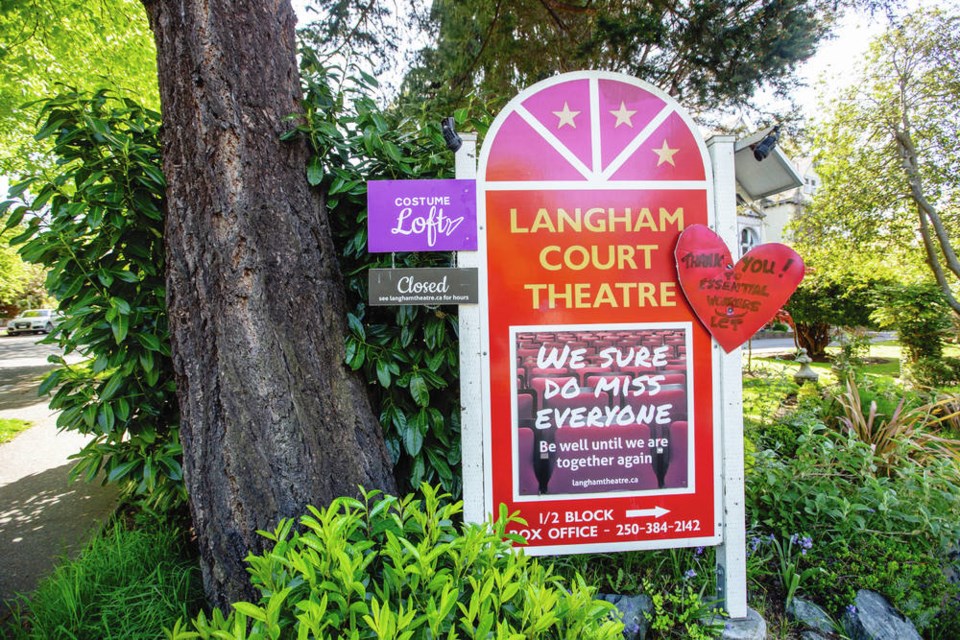A Victoria actor who was verbally abused and spit on by strangers and told to leave town for bringing a racial discrimination complaint against a local theatre company says a simple apology and acknowledgment of the discrimination would have addressed the harm.
Tenyjah McKenna lodged a complaint with the B.C. Human Rights Tribunal in 2017 after being told there were no roles for Black women in a play she wanted to audition for at Victoria’s Langham Court Theatre.
Tribunal documents show when McKenna contacted director Judy Treloar about an audition for Les Belles-soeurs and said in an email that she was Black, Treloar responded: “As much as I do not like saying this, the 15 women in this play are Quebecois women and the play is set in Montreal in 1965. A black woman would not be a neighbour or a sister in this play, however I would love to meet you and hear you read.”
McKenna, a Black woman from Montreal whose parents lived in the neighbourhood where the play takes place, said she felt like the claim erased her existence.
“She literally says, ‘Black people did not exist in Montreal, Quebec, in the ’60s,’ which erases my parents’ existence. That then erases me… The layers of erasure that that put me under, I couldn’t not say anything about it,” McKenna said.
When she pointed out the historical context to the director, McKenna said she received what felt like excuses, when what she wanted was an acknowledgement of what happened.
“It would have been super easy in having somebody just say: ‘Sorry, I apologize that you were racially discriminated against.’ Done. That’s it,” McKenna said.
She said people often misunderstand why they’re being called out, thinking it’s an attack.
McKenna, who had performed with the theatre before and enjoyed her experience, said she called out the director and theatre, because she wanted to keep working with them, but she needed them to recognize their barriers to inclusivity.
“Call-out culture isn’t supposed to be weaponized. It’s not. It’s literally: ‘I enjoy this so much. And I want you to survive. This is what you need to fix,’ ” she said.
Despite facing harassment on the street from people accusing her of ruining theatre and strangers calling her parents demanding to know their immigration status, McKenna said she would do it all again if she had to.
“Because of the one step that I took, other BIPOC artists are taking that chance to step out and say: ‘OK, this happened to me,’ ” she said.
Last month, McKenna and representatives of the theatre company reached a resolution to the human rights complaint with the help of a mediator.
Kathy Macovichuk, vice-president of the theatre company’s board of directors, said the theatre is approaching companies to conduct a diversity and equity audit of the organization, as well as diversity and communication training for the board, volunteers and staff.
Macovichuk said some workshops have been held, but much of the work has been delayed due to the pandemic, as the organizations they’ve contacted to run online training are in high demand.
Kyle Kushnir, a former member of the theatre company for about a decade, said he was disappointed with Langham’s “bland” statement about the resolution, and thinks the company is doing little to address the underlying problems that led to the human rights complaint.
“There’s lots of kind of historical issues there within the theatre that they just have failed to address, and what better time to address them?” he said.
During the decade that he was involved with the theatre, he was aware of a small handful of people of colour cast in productions, he said.
Kushnir also pointed to the company’s 2015 production of Charles Dickens’ The Mystery of Edwin Drood, which sparked outrage because it featured white actors wearing dark makeup to appear South Asian, and the theatre’s use of a swastika in marketing materials for a show about a Nazi filmmaker.
He said the company has done little to address these issues, and “from my point of view, they have very little interest in doing anything.”
Kushnir was part of a transition committee established in part to make suggestions to the board on how to make the theatre a more inclusive place. Those suggestions included issuing an apology for some of the company’s previous harmful acts and removing photos of life members, who are almost entirely white. The committee was disbanded after several months.
Macovichuk said the committee was always intended to be temporary and the board felt it had done all it could. She said she voted to disband it because she felt the group wasn’t willing to work with the board.
Macovichuk acknowledged that the theatre’s work to address issues has been slow, and that many people are frustrated it’s not changing as quickly as they would like it to.
“But we are committed as a theatre to doing this. We want to make this an inclusive and welcoming place,” she said.
The theatre has formed a group to reach out to racialized and marginalized communities to see how they can work together.
“We’re hoping if we invite these communities in, we just kind of break down the barriers,” Macovichuk said.
The theatre company previously applied to have the complaint dismissed after making a $1,500 settlement offer to McKenna and making changes to address discrimination, but tribunal member Beverly Froese denied the application in 2019, saying a full hearing was required.
Treloar could not be reached for comment.
regan-elliott@timescolonist.com



